It’s 20 minutes into Bayern Munich’s penultimate Bundesliga game before the World Cup break, a 6–1 win over Werder Bremen, and Sadio Mané goes down under a challenge. When he sits up, it’s clear something is wrong. His face is blank, but he must know what this may mean. He is forced off. There’s a hope it’s largely precautionary, but the news soon breaks: It’s an injury to his right knee, and his World Cup is in doubt.
Macky Sall, Senegal’s president, tweeted his recovery wish. Aliou Cissé, Senegal’s manager and captain of its most successful World Cup team—the team, with Mané as the driving force, Senegal was hoping to match or even surpass in Qatar—could hardly come to grips with what he must have known at the time was an inevitability.
“Losing Sadio Mané is not something small for Senegal and African football,” he said upon revealing Senegal’s World Cup squad. “I cannot speak of his absence even if in my head I have to take this into account.”
Mané was named to Senegal’s World Cup squad anyway, as there were distant hopes he might make the third group game, but those hopes didn’t last long. Thursday it was confirmed that he had surgery to reattach a tendon to the head of his right fibula, promptly ruling him out of the World Cup. For Senegal, and for its man of the moment, it is a desperately harsh blow.
A look back to last winter—and a look back to Mané’s origin story—provides all the evidence why. Mané spoke to Sports Illustrated shortly before he suffered his injury, and while events have changed things significantly, his thoughts and his words still offer insight into what football means for him—and what he means for Senegal.
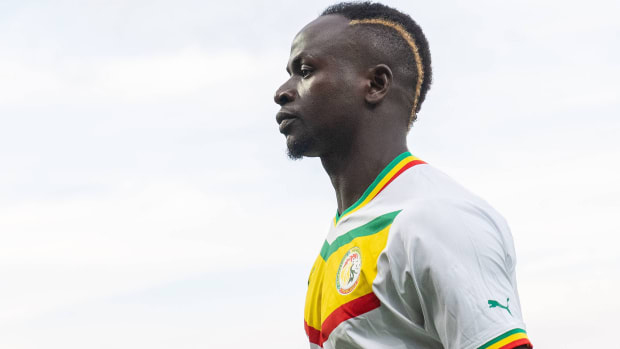
Sebastian Frej/Imago Images
It’s February 2022 at the Olembe Stadium in Yaoundé, Cameroon. Two hours earlier, Mané had seen his seventh-minute penalty saved by Egypt goalkeeper Mohamed Abou-Gabal. And now, after the Africa Cup of Nations final had finished goalless, he steps to the spot again. Édouard Mendy has just saved from Mohanad Lasheen, which means that if Mané converts Senegal’s fifth kick in the shootout, his country will be champion of Africa for the first time.
Mané walks forward, apparently calm. He looks to his left and to his right. He gives the goalkeeper a stare. On the halfway line his Liverpool teammate at the time, Mohamed Salah—who is scheduled to take Egypt’s fifth kick—covers his eyes with his shirt. Mane’s nine teammates congregate on the halfway line. Bamba Dieng is on his knees. Idrissa Gueye fiddles with the sweat bands on his wrists. Bending forward, Bouna Sarr shoots an anxious glance along the line. Slowly, deliberately, Mané places the ball on the spot.
There is a sense Mané’s whole life has been building to this moment.
In 2002, the last day of school before the summer break fell on May 31. Mané remembers it clearly. It was also the first day of the World Cup, and he was 10 years old. He gave his school bag to his sister to take home and went to a friend’s house to watch the match.
“My family didn’t like football,” he explains. “Nobody cared about it. But as a young boy me and my friend always watched the national team play. At the time we had TV, but they only turned it on in the night. They would say, ‘Oh, boys, you’re very young; you have to focus on school, not watching TV,’ stuff like this, so I would go out to watch football games with my friends.
“When Senegal played, you had at least 20 people together watching the game. We like this kind of thing, everybody watching the national team, shouting, arguing together. That is still going on now in the village. When I am playing and I see videos, they have the same thing now. They watch, even 50, 100 people together.”
That day was extra special. It was the first World Cup Mané had really watched, and it was the first World Cup for which Senegal had ever qualified. The general consensus was that this was the greatest Senegal side of all time. Three months earlier, in Mali, Bruno Metsu’s side had reached the final of the Cup of Nations only to draw 0–0 and lose on penalties to Cameroon. And that first World Cup game was Senegal against the world champion, France. “We were colonized by France. We have not a bad rivalry, but I think a little bit,” he says as he bangs his fists together with a grin, “and for us it was really, really important to win this game.”
And Senegal did win, producing one of the biggest shocks in World Cup history. To the wider world, Pape Bouba Diop’s winner may be the most famous moment in the whole history of Senegal. “It was a great, great day,” says Mané, “a great memory for me. For a Cup of Nations or a World Cup, you have to be there to know what it’s like. It’s a completely, completely different mood in the country.”
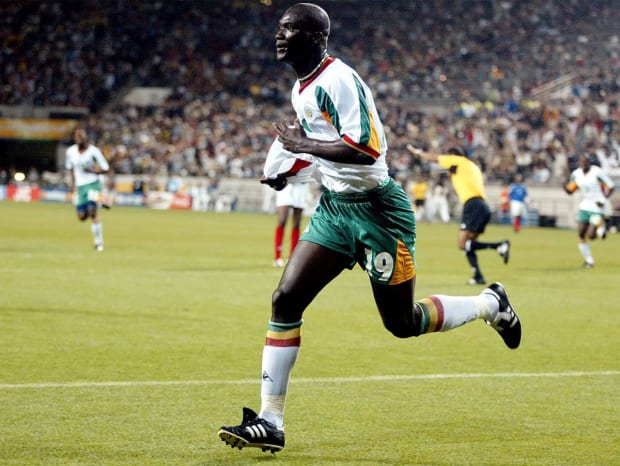
Pro Shots/Imago Images
That group of World Cup quarterfinalists inspired him. “The 2002 team were my biggest role models,” he says. “El-Hadji Diouf was one of my heroes. Aliou Cissé was one I liked, Salif Diao also and Khalilou Fadiga as well. When I was young my big target was to become a football player and try to play for my national team, especially.”
The problem was less talent, which Mané had in abundance, than circumstance. His father, an imam, had died when Mané was 7, and his family thought football was “a waste of time.”
“There were many examples in the village, many boys who loved football. They practiced almost all their lives but had no success. They stopped everything for football,” he says. “At the end of the day if you reach a certain age and have no success, you have no Plan B, so it’s difficult. My family said, ‘You can’t play football. What are you going to do? Go to school and be something else which is important for yourself.’ They wanted me to be a success, but they thought I would never have success in football.”
But Mané knew he was not like the other boys. He knew he was good, really good. “Everybody said I was the best in the village,” he says. “Maybe I wasn’t good enough, but I thought I was because I watched TV and I would see players and think, ‘Oh, I think I can also have success.’”
So he hatched a plan. “I didn’t see myself being anything else but a football player,” he says. “I decided to escape. I didn’t tell anybody. If I had told them they would have been very angry and punished me.”
One night when he was 15, he packed a bag and hid it a long way from home. He went to bed as usual, but got up at 4 a.m., collected his bag and got on the bus. He traveled from Bambali, his village on the Casamance River in the south of Senegal, took the pirogue over the River Gambie and then carried on to Dakar, the capital, where he stayed with the family of a friend. That was his start. Playing for the Dakar side Generation Foot, he was spotted by Metz in France, joining the club in 2011. The ascent has been steady in the decade-plus since. He then moved to Red Bull Salzburg and Southampton before finding global acclaim at Liverpool and eventually joining Bayern Munich last summer. His second-place finish in the Ballon d’Or voting in October was the highest for an African since George Weah won the award in 1995. And with Mané leading the way and Cissé at the helm, Senegal had visions of matching its feat of 2002—and perhaps putting an end to Africa’s elusive quest to field a World Cup semifinalist—until disaster struck.
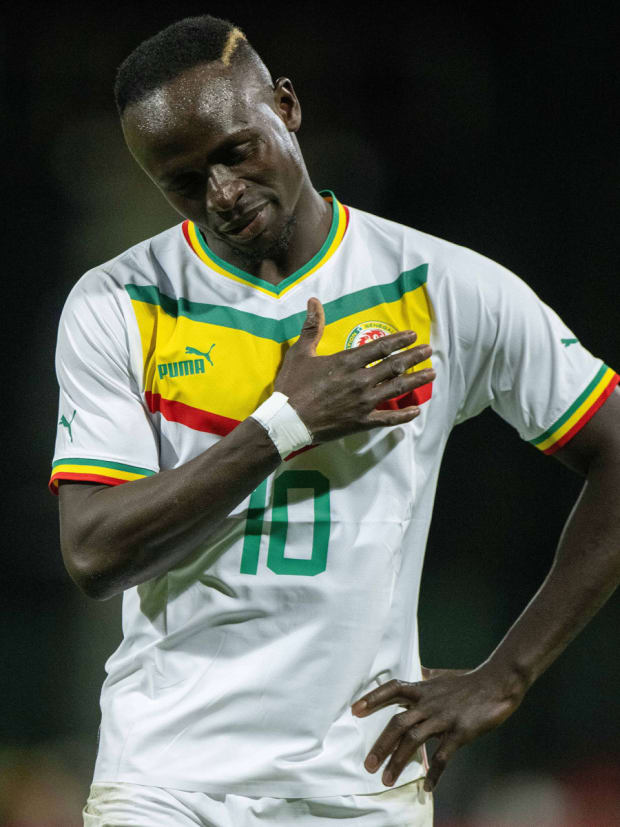
Sebastian Frej/Imago Images
Mané doesn’t usually have problems sleeping. “The Champions League or something—I always sleep like a baby,” he says. But Cameroon earlier this year was different. He has won the Austrian Bundesliga with Salzburg and the Premier League and Champions League with Liverpool, where, with Salah and Roberto Firmino, he was part of one of the greatest forward lines English football has known. But with Senegal at the Cup of Nations there was a sense not just of doing something for his country, but of time passing, particularly given it had lost to Algeria in the previous final.
“All the boys are a perfect age to have maturity, playing some of the best football of their lives,” he says.
If not this time, then when? And while there were other top-class players in this Senegal squad—Kalidou Koulibaly, Mendy, Gueye—it is Mané who was the star, he who must shoulder the bulk of the responsibility.
And perhaps also there was a memory of 20 years ago, of watching his first World Cup, of returning something to the people he had left behind, of winning in Cameroon the trophy that that team of Diouf, Cissé, Diao and Fadiga had so narrowly failed to win against Cameroon. Mané has funded medical, educational and sporting facilities in Bambali—he was given the Socrates Award at the 2022 Ballon d’Or gala for his humanitarian work back home—but there are other things that money cannot buy.
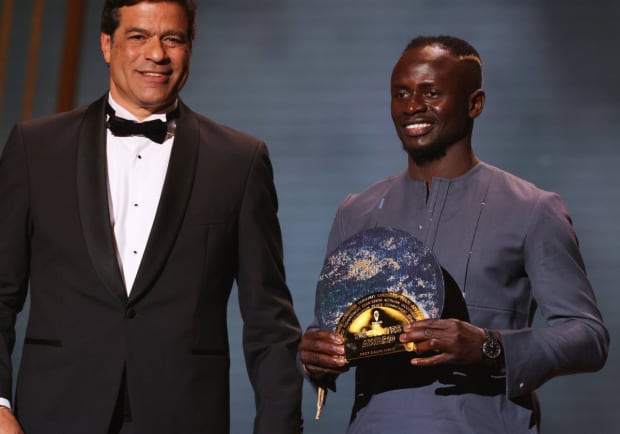
Gao Jing/Xinhua/Imago Images
“I can’t explain how tough it was for me,” he says. “When I went to this Africa Cup, I felt we could do something but I didn’t know how. I have a kind of pressure on myself. I was sleeping four or five hours a night, five hours maximum. I had a big pressure in my head. I would go to bed and wake up maybe at 4 a.m. and I could not sleep any more. I would watch a movie and do some meditation and then go to the gym, have breakfast even if I was the only one there.
“When I woke up, sometimes I wanted to go without my phone, to try to be calm, to think about nothing. When I tried to watch Netflix, I started to watch and I wasn’t there. When I tried to sleep, I couldn’t sleep; I’m thinking … So I said, O.K., calm, all the time. Turn the phone off. I enjoyed the moments when I was with my teammates at the table. And when I was training. When I was alone, it was too much.
“I started meditating four to five years ago. I had some conditioning person talking to me about it and I wasn’t interested, but then I was talking to someone, I don’t know who, and they said I should go to YouTube and check it out, and I decided to give it a try. At first my head was going, Gah!, but when I got some pointers and I tried to concentrate a lot and be myself …”
Mané had missed the vital penalty in a shootout in the Cup of Nations quarterfinal against Cameroon in 2017. He had missed in the first few minutes of the final this past winter, when Salah, who must have seen him take hundreds of penalties in training, had seemed to tell the goalkeeper which way to dive. And then he had to take perhaps the most important penalty in his country’s history.
“I can say it was one of the hardest things in my life,” he says. “If you think back on all these kinds of things and you think that in the 60 years since we got our independence we have never won it, it was not easy. But in that moment when I took the penalty I just said, O.K., this is part of life. You have to think in a positive way. … Imagine if I score.
“Before I took the penalty, all the boys came to me in the middle of the pitch, everybody, all the players, they said they believed in me, told me to make history for them. When I went to take the penalty, I didn’t hear anything, nothing, just focus. Then I shot and scored.”
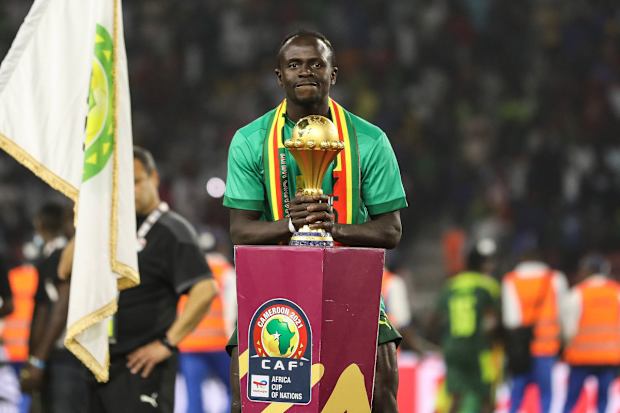
Sebastian Frej/Imago Images
A month later, Mané faced almost exactly the same scenario: a decisive penalty in a shootout against Egypt, only this was to qualify for the World Cup. And this time, Salah had already missed. This time, it was at home in Dakar, where fans shone green laser pens into the face of opposing goalkeeper Mohamed El Shenawy.
“There was a massive, massive pressure,” says Mané, his nation’s all-time leading scorer with 34 goals. “But the pressure was not as high as the Africa Cup because it was at home. Everybody, all the stadium was with us, and I had a calmness. That was also special because we’d beaten Egypt, so this was a kind of revenge for them, and there was a little something between me and Salah. It was important for us to confirm that we did not win the Africa Cup by luck. It showed we really deserved to win.”
And win the Lions of Teranga did, securing their place in Qatar. Four years earlier, Mané played at the 2018 World Cup in Russia, scoring in the 2–2 draw against Japan. With a win over Poland and a loss to Colombia, Senegal finished with an identical record to Japan but were eliminated on the sixth tiebreaker, fair play—having more yellow cards. That was clearly a great frustration, particularly as Japan went 2–0 up in its last-16 match against Belgium before losing 3–2, a match Mané watched at the airport.
“When they were 2–0 up, I thought, Oh, that could have been us,” he says. “It was a crazy, crazy game. I think the way was there for Japan to go through even though Belgium was really, really strong.”
That disappointment was followed a year later by the Cup of Nations final loss to Algeria.
“You go close and you know that you want to progress and you never give up,” Mané says. “I think this can give you extra motivation to do better. We were very, very close in 2019. But we didn’t give up. We said to ourselves we still had work to do. We had a young team, so why not stick together and try to give our best, dream big and try to give big things for our country? And that was exactly how it was.”
With preparations disrupted by both the compressed calendar and a number of positive COVID-19 tests, it took Senegal time to play fluently at the Cup of Nations.
“When we got all the boys back, then it was very impressive,” Mané says. “We have our team: when we press we know how to press, when we drop back we know how to drop and then we play counter.”
He fears, though, that the lack of preparation time leading into Qatar, with several major leagues breaking just days before the competition starts, will affect the general quality.
“It’s an issue for every team,” he says. “This is something that has never happened before. At least you have two or three weeks. A national team is not a club, where you would train every day for a year together. In a club everybody has a different style of football, dropping or playing back or with a high defensive line. You know these specific things, and if you take players and bring them together, they need more than a week to prepare. After that you have some players who are not playing regularly in their respective clubs and all these kind of things will be an issue this year. But what can you do? You have to deal with the situation how it is.”
Senegal, with recent experience of playing—and winning—a tournament together may be less affected than most and may benefit. But it will be without Mané, a victim of that lack of preparation time. With another two or three weeks between the final league games and the World Cup, he perhaps may have played some role. That leaves Senegal without its talisman, its most effective striker and the man it has come to rely on in clutch situations.
Mané should have gone to this World Cup as the man who made his country the champion of Africa, but instead he will be in a gym in Munich, rehabilitating. Given the very real notion that Senegal has never had a better squad than this, that feels awfully cruel. But football can do that, and FIFA, with the scheduling of this World Cup, has made that cruelty more likely. At least Mané had a run in Russia and his glory in Cameroon, but he will not live out in Qatar the dream that was conjured at his friend’s house in Bambali 20 years ago. It is his and Senegal’s great sadness.







